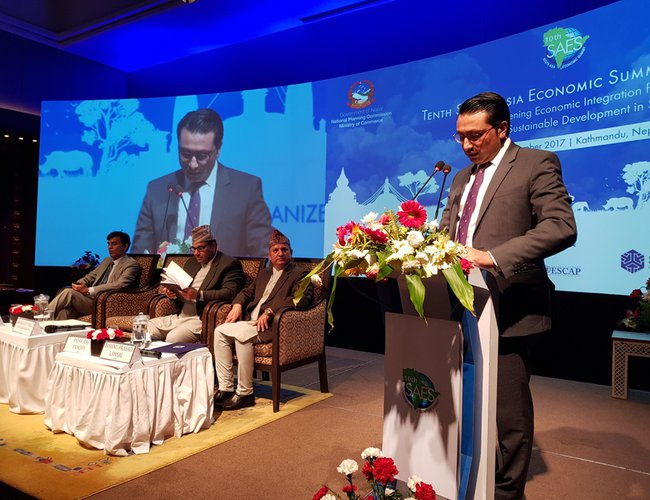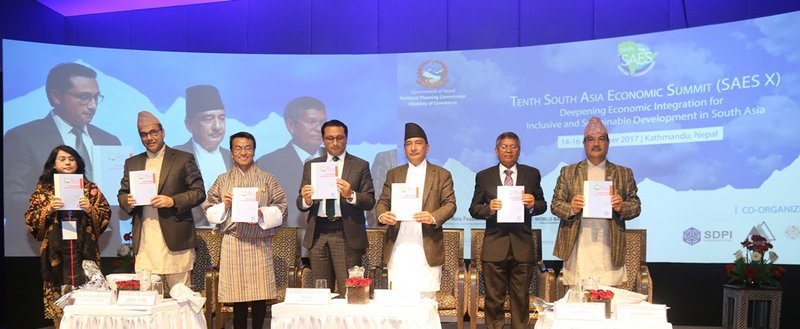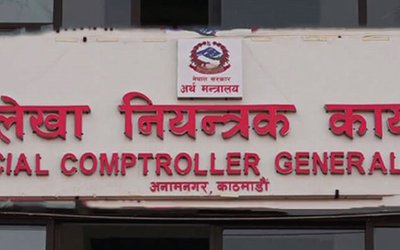
After three days of hectic discussion, the Tenth South Asia Economic Summit (SAES-X) has concluded with a call to enhance regional cooperation. Participated in by high level officials and experts from the region, SAES-X clearly laid down the need for integration to achieve higher economic growth.
At the event, inaugurated by Minister for Finance Gyanendra Bahadur Karki, a Bhutanese minister also addressed the opening session. Minister for Commerce Dr. Min Bahadur Bishwokarma highlighted the need to strengthen the SAARC.
The stalling of South Asian Association for Regional Cooperation (SAARC) has doubly highlighted the importance of Track II initiatives like the South Asia Economic Summit, according to Dr. Swarnim Wagle, Vice Chairman, and National Planning Commission.
Dr. Wagle was making a statement at the concluding ceremony of the Tenth South Asia Economic Summit (SAES X). He also called on the initiative to think about setting up a permanent secretariat to institutionalize the region-wide deliberations on regional issues.
During one of the plenary sessions, Prof. Rehman Sobhan, Chairman, Centre for Policy Dialogue, Bangladesh, said the move away from SAARC is not an altogether new phenomenon, and at such times, civil society needs to be particularly proactive to keep the idea of South Asia alive.
Dr. Abid Qaiyum Suleri, Executive Director, Sustainable Development Policy Institute (SDPI), Pakistan, said if South Asia can still move ahead despite Pakistan’s lack of readiness in Motor Vehicle Agreement it shows that complementarities do attract initiatives for cooperation.
Dr. Nagesh Kumar, Director, Social Development Division, United Nations Economic and Social Commission for Asia and the Pacific (UNESCAP), said that sibling rivalries are the fact of life among neighbors that hold back cooperation. But, he said, there will also be sudden upsurge in complementarities to push cooperation forward.
Dr. Dushni Weerakoon, Executive Director, Institute of Policy Dialogue of Sri Lanka, said that each country in the region was undergoing its own travails at the moment stalling the regional process for the time being.
Dr. Posh Raj Pandey, Chairman, South Asia Watch on Trade, Economics and Environment (SAWTEE), highlighted the need to focus on trade in services with the sector’s increasing growth and contribution to the economies of the region, including at the firm level that helps the small entrepreneurs and the overall economy. He pointed out that the implementation modality of SAARC Agreement on Trade in Services (SATIS) be sorted and SATIS be implemented without any further delay.
Former Minister for Water Resources Deepak Gyawali, in his presentation at an expert session on energy cooperation, said that most of the complexities in cooperation in the hydropower sector arise from a failure to recognize the multipurpose nature of hydropower projects and going after them only as clean energy projects. He cited the example of farmers getting a free ride on irrigation water while energy users foot the bill.
Panelists discussed the shortcomings of regionalism and ways to overcome them in other different sessions. Some saw sub-regionalism undermining South Asian regionalism, while others saw the trend strengthening countries’ willingness to benefit from new complementarities that were unavailable previously.
China came up frequently in addresses of speakers of the different sessions. They thought that because of China’s centrality in economic relations of every SAARC member, it too should be given space in collective sub regional forums that are already there or are to be formed in the future. The discussants also explored the possibilities of tapping the observers as dialogue partners while discussing the tremendous challenges associated with their deeper engagement.
The tenth summit was organized jointly by the National Planning Commission (NPC), Ministry of Commerce, Government of Nepal and South Asia Watch on Trade, Economics and Environment (SAWTEE) from 14-16 November in Kathmandu with 'Deepening Economic Integration for Inclusive and Sustainable Development in South Asia" as the summit theme.
About 300 participants, including renowned researchers, academicians, experts across various disciplines, government officials, diplomats from the region as well as abroad participated in 20 sessions over three days.
The South Asia Economic Summit was launched in 2008 as a platform to discuss and analyze development challenges facing South Asia. The annual event brings together regional experts from various fields from across the South Asian region.
South Asia Watch on Trade, Economics and Environment (SAWTEE), Nepal; Centre for Policy Dialogue (CPD), Bangladesh; Research and Information System for Developing Countries (RIS), India; Sustainable Development Policy Institute (SDPI), Pakistan; and Institute of Policy Studies of Sri Lanka (IPS), Sri Lanka take turns to organize the annual event in one of the SAARC countries.
- TANAHU HYDROPOWER PROEJCT: A Significant Achievement
- Apr 15, 2024
- AMBASSADOR HANAN GODAR: Sharing Pain With A Nepali Family
- Mar 30, 2024
- VISIT OF KfW AND EIB TO NEPAL : Mission Matters
- Mar 25, 2024
- NEPAL BRITAIN SOCIETY: Pratima Pande's Leadership
- Mar 24, 2024
- NEPAL ARMY DAY: Time To Recall Glory
- Mar 15, 2024
















